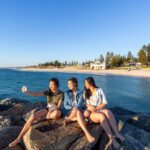Climate change, food security and loss of biodiversity are just some of the critical issues impacting today’s global island communities. As executive director of the Global Island Partnership (GLISPA), Curtin graduate Kate Brown is bringing together island leaders to create a more sustainable future.
An international expert, Brown works with major organisations like the United Nations (UN) and the World Bank, as well as NGOs, and island and partner governments to create meaningful policy and change.
Brown says her role at GLISPA, a platform which promotes building resilient and sustainable island communities, is to connect the dots between ideas, islands, projects and organisations.

“A lot of my work is behind the scenes, acting as the glue that binds projects and people together,” she explains.
“I spend a lot of time at the United Nations in the US. It’s really special seeing how all of the world can come together to grapple with important global issues.”
She says islands today face multiple concerns.
“The big concerns include climate change, water, loss of biodiversity, debt servicing due to natural disasters and food security, and the diversification of energy sources and energy conservation.”
Brown explains that many islands import more than eighty per cent of their food.
“Hawaii, for example, imports around ninety per cent of its food causing multiple issues – high cost of food, vulnerability to external disasters and supply chains, and a huge carbon footprint from food transport. Pre-colonisation, Hawaii had a population size similar to today and yet was completely self-sufficient. Today, the island has just four days’ worth of food if a boat doesn’t arrive. Obviously, we can’t return to the past but I think we need to thoughtfully reconsider what development means.”
Other significant issues impacting islands include population shifts from outer islands into urban centres, non-communicable diseases and species extinction.
“Islands are home to twenty per cent of all bird, reptile and plant species, many of which are unique and found nowhere else in the world,” Brown says.
“Yet islands, which make up only 5.3 per cent of the world’s land area, have hosted sixty-one per cent of all recorded extinctions since the sixteenth century.”
Despite these pressing issues, Brown says islanders are some of the most resilient people she has ever met.
“I believe we need to share the stories of island people far more,” she says passionately.
“I am so inspired by the innovation and resourcefulness I see every day.”
An important voice
Brown’s expertise has ensured her a spot in the world’s most influential meetings.
“A highlight of my career has been making sure that an ‘island voice’ is featured at the United Nations and other international meetings,” she smiles.

“It’s critical that the perspectives of island communities are included in global environmental policy.”
She firmly believes that all islanders should be able to live out their lives at home.
“It’s the underpinning element of the partnerships I run and it’s the reason I do my job,” she says with fervour.
“I want to be part of enabling that to happen.”
Last year, Brown announced a new initiative at the UN General Assembly.
“I co-founded the Local2030 Islands Network to focus on finding early leadership on islands,” she says.
“It’s the world’s first global, island-led network devoted to advancing the UN Sustainable Development Goals through locally-driven, culturally-informed solutions.”
An island home
No stranger to islands, Brown is originally from New Zealand and has lived and worked in Australia, Fiji and Samoa, as well as the US.
“I am Maori from a large Maori extended family,” she smiles.
“I now call New Zealand home again but I love all the experiences I’ve had living overseas and the chance to experience so many cultures. I admire the value people in Fiji and Samoa place on relationships and humour, the confidence I found in the US and the chance to experience living in the Australian Outback. I spent four months in an Aboriginal community between Halls Creek and Kununurra, which exposed me to some of the most special parts of the country.”
Indeed, Brown began her career in sustainability in Western Australia.
“My first job when I graduated from Curtin with a Bachelor of Arts was setting up the communications elements for a project on wool grower sustainability,” she explains.
The successful project led to her nomination as one of Australia’s first Youth Ambassadors – and a stint working in Fiji.
It was the first of several island placements.
“After Fiji, I went to Samoa where I worked on critical issues around biodiversity conservation,” she explains. “I helped Pacific island countries develop and update national strategies and action plans, and created a regional group of government officials to share ways and means to implement the plans.”
A strong foundation
Brown says studying journalism at Curtin has been deeply beneficial to her career.
“Studying journalism at Curtin has given me the confidence to do almost every aspect of my career,” she enthuses. “It taught me to see the connections between pieces of information and how to interact with people, which has been a core part of my job.”
Her classes in international relations and politics have proven to be equally useful.
“I use the knowledge every day!” she exclaims. “Why are countries motivated to take action? What are the outcomes of that action? I learned the fundamentals of these concepts at Curtin. I remember a specific assignment on the impact of Pakistan and India’s relationship on the Indian Ocean rim and I’ve used that information a lot – particularly as I work very closely with islands in the Indian Ocean region and nearby countries like Kenya, South Africa and Tanzania.”
 Brown says the diversity she experienced at Curtin prepared her well for an international career.
Brown says the diversity she experienced at Curtin prepared her well for an international career.
“When I arrived at Curtin, I was fresh from a country high school in Katanning, so I was a bit shell-shocked in my first year!” she laughs.
“Coming from the country, the diversity of people on the campus was eye-opening but I really enjoyed it. Curtin taught me to be more confident, to ask questions and to better understand why things happen.”
A global impact
In October, Brown was presented with Curtin’s Alumni Achievement Award for Global Impact for her compassionate leadership and dedication to building a more sustainable future for islands worldwide.
“It is an amazing honour,” Brown smiles. “It says that the work I’m doing is important and relevant, and is a vindication in many ways of the sacrifices it took to get to this point. It tells me that you can get anywhere as an Indigenous woman and as a single parent (in the early part of my career) with few resources. It shows that any student at Curtin has the opportunity to find a path that can make a difference in this world.
“I will be forever proud of this achievement.”
Keen to work in a similar field? Brown shares her top tips.

- Maintain your integrity. Many people want to work on islands but this work is all about relationships. Once you lose someone’s trust, it’s really hard to get that back. It’s really important to treat people well, no matter what their role is.
- Head overseas! It may be tricky at the moment but try to get some international experience under your belt. I was an Australian Youth Ambassador in Fiji and an Australian volunteer in Samoa, living on a local salary. It really helps you to see the world from a different perspective, both financially and culturally.
- Speak up! Work on your public speaking. Being able to share your ideas clearly and well is really important to this work.
- Finally, keep going and don’t give up!



